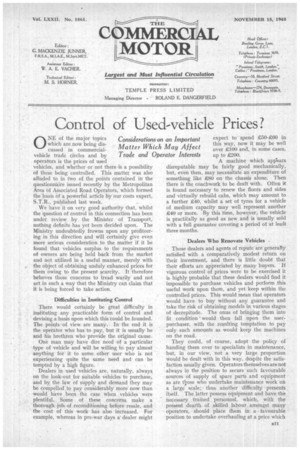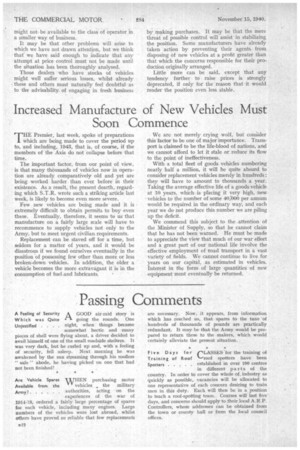Control of Used-vehicle Prices?
Page 17

Page 18

If you've noticed an error in this article please click here to report it so we can fix it.
0 NE of the major topics which are now being discussed in commercialvehicle trade circles and by operators is the prices of used vehicles, and whether or not there is a possibility of these being controlled. This matter was also alluded to in two of the points contained in the questionnaire issued recently by the Metropolitan Area of Associated Road Operators, which formed the basis of a powerful article by our costs expert, S.T.R., published last week.
We have it on very good authority that, whilst the question of control in this connection has been under review by the Minister, of Transport, nothing definite has yet been decided upon. The Ministry undoubtedly frowns upon any profiteering in this direction and will certainly give even more serious consideration to the matter if it be found that vehicles surplus to the requirements of owners are being held back from the market and not utilized in a useful manner, merely with + the object of obtaining unduly enhanced prices for them owing to the present scarcity. It therefore behoves those concerns to tread warily and not act in such a way that the Ministry cat claim that it is being 'forced to take action.
Difficulties in Instituting Control There would certainly be great difficulty in instituting any practicable form• of control and devising a basis upon which this-could be founded. The points of view are many. In the end it is the operator who has to pay, but it is usually he and his brethren who provide the original cause.
One man may have dire need of a particular type of vehicle and will be willing to pay almost anything for it to some other user who is not experiencing quite the same need and can be tempted by a high figure. .
Dealers in used vehicles are, naturally, always on the look-out for suitable vehicles to purchase, and by the law of supply and demand they may be compelled ,to pay considerably more now than would have been the case when vehicles were plentiful. Some of these concerns make a thorough job, of reconditioning before resale, and the cost of this work has also increased. For example, whereas in pre-war days a' dealer might expect to spend L50-£60 in this way, now it may be well over £100 and, in some cases, up to £200. A machine which appears disreputable may be fairly good mechanically, but, even then, may necessitate' an expenditure of something like £80 on the chassis alone. Then there is the coachwork to be dealt with. Often it is found necessary to renew the floors and sides and virtually rebuild cabs, which may amount to a further £40, whilst a set of tyres for a vehicle of medium capacity may well represent another 40 or more. By this time, however, the vehicle is practiCally as good as new and is usually seld with a full guarantee covering a period of at leak three months.
Dealers Who Renovate Vehicles .
Those dealers and agents of repute are generally satisfied, with a comparatively modest return on their investment, and there is little doubt that their efforts are appreciated by many buyers. If vigorous control' of prices were to be exercised it is highly probable that these dealers would find it impossible to purchase vehicles and perform this .useful work upon them, and yet keep within the controlled prices. This would mean that operators would haveto buy without any guarantee and ,take the risk of obtaining models in various stages 'of decrepitude. The onus of bringing them into fit condition would then fall upon the userpurchaser, with the resulting temptation to pay only. such amounts as would keep the machines on the road.
They could, of course, adopt the policy of handing them over to specialists in maintenance, but, in our view, not a very large proportion would be -dealt with in this way, despite the satisfaction usually given. Operators themselves are not always in the position to secure Such favOurable sources of supply of spare parts and equipment as are Qose who undertake maintenance work on a .large scale; thus another difficulty presents itself. The latter possess equipment and.have-the necessary -trained personnel, which, with the present dearth of skilled labour amongst many operators, should place them in a favourable position to undertake overhauling at a price which might not.be available to the class of operator in a smaller way of business.
It may be that other problems will arise to which we have not drawn attention, but we think that we have said enough to indicate that any attempt at price control must not be made until the situation has been thoroughly analysed.
Those dealers who have stocks of vehicles might well suffer serious losses, whilst already these and others must naturally feel doubtful as to the advisability of engaging in fresh business by making purchases. It may be that the mere threat of possible control will assist in stabilizing the position. Some manufacturers have already taken action by preventing their agents from disposing of new vehicles at a profit greater than that which the concerns responsible for their production originally arranged.
Little more can be said, except that any tendency further to raise prices is strongly deprecated, if only for the reason that it would render the position even less stable.




























































